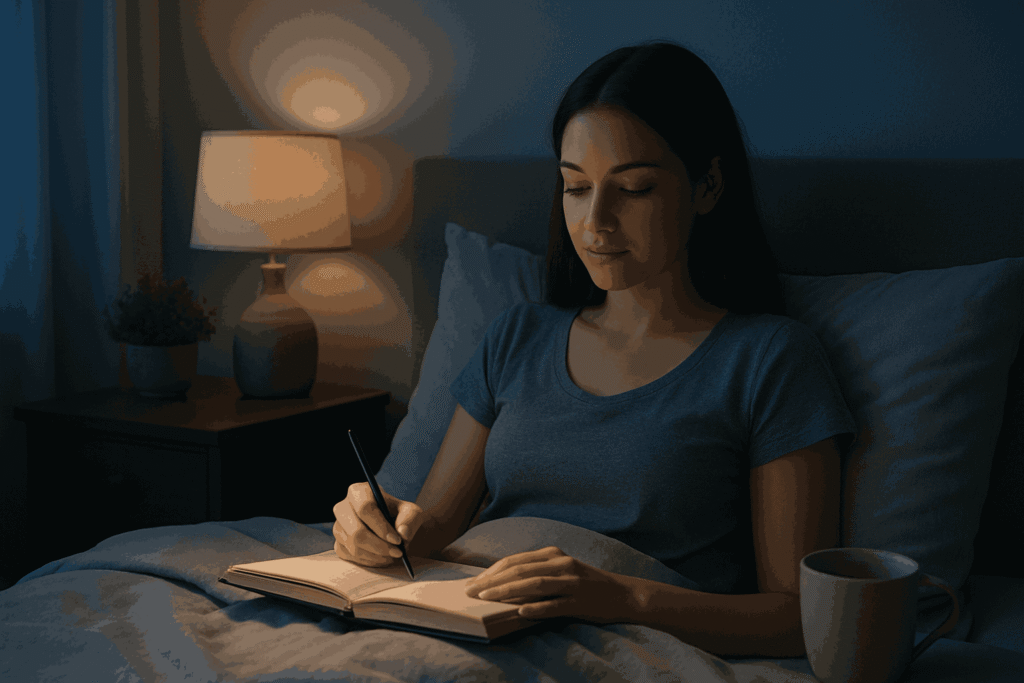Do you feel fine during the day, but the moment you try to sleep, your thoughts spiral? You’re not alone. Nighttime anxiety is one of the most common struggles for people dealing with stress, overthinking, or depression. The mind races, the heart beats faster, and sleep feels impossible.
The good news? You can learn how to stop anxiety at night with calming habits and simple shifts in your evening routine. Let’s explore 8 effective strategies to help you quiet your mind and sleep better.
1. Create a Calming Night Routine
Your body needs signals that it’s time to wind down. Try turning off bright lights, limiting noise, and engaging in relaxing activities like reading, journaling, or taking a warm shower. Doing this consistently tells your brain it’s time to relax.
2. Limit Screen Time Before Bed
Scrolling through social media or watching intense shows stimulates your brain and makes anxiety worse. Blue light from screens also suppresses melatonin, the hormone that helps you sleep. Try turning off all devices at least one hour before bed.
3. Try a Guided Sleep Meditation
A short guided meditation can work wonders for calming the mind. Apps like Calm, Insight Timer, and YouTube have free meditations designed for sleep. Even 5 to 10 minutes of mindful breathing or body scanning can reduce nighttime anxiety.
4. Use the 4-7-8 Breathing Technique
This breathing exercise helps your body shift into a relaxed state. Inhale for 4 seconds, hold for 7, and exhale slowly for 8 seconds. Repeat this for a few minutes while lying in bed — it can significantly slow down racing thoughts.
5. Avoid Caffeine After 2 PM
Even if you fall asleep after drinking coffee, caffeine can make your sleep lighter and increase the chances of waking up anxious. Try herbal teas like chamomile or lemon balm in the evening instead.
6. Keep a Worry Journal Nearby
When your thoughts won’t stop, write them down. Keeping a “worry journal” beside your bed gives your brain permission to release those thoughts. Sometimes just putting your fears on paper is enough to quiet your mind.

7. Use Soothing Background Sounds
Playing soft white noise, nature sounds, or rainfall can create a peaceful environment that helps block out anxious thoughts. These gentle sounds work as a distraction and help you ease into sleep more naturally.
8. Focus on Progress, Not Perfection
It’s normal to feel frustrated when you can’t sleep. But stressing about not sleeping adds to the problem. Be kind to yourself and remember: every small step you take is progress toward better nights and calmer mornings.
Related Posts You May Find Helpful:
- How to Manage Anxiety Naturally: 9 Calming Tips That Actually Work
- How to Stop Morning Anxiety: 7 Habits That Help
These two posts dive deeper into calming routines and anxiety-reducing habits that support your overall well-being.
Final Thoughts
Nighttime anxiety doesn’t mean you’re broken — it just means your mind needs care, not judgment. With the right habits and mindset, you can gently train your brain to feel safe, calm, and ready for rest. Start small. Even one calming habit tonight could make a difference.


